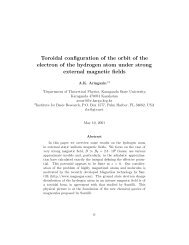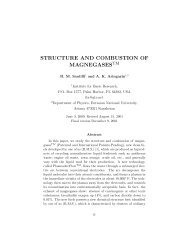the new fuels with magnecular structure - Institute for Basic Research
the new fuels with magnecular structure - Institute for Basic Research
the new fuels with magnecular structure - Institute for Basic Research
You also want an ePaper? Increase the reach of your titles
YUMPU automatically turns print PDFs into web optimized ePapers that Google loves.
THE NEW FUELS WITH MAGNECULAR STRUCTURE 9<br />
It should be indicated that gasoline combustion causes much less oxygen depletion<br />
than hydrogen combustion, <strong>for</strong> various reasons. The first is that gasoline<br />
combustion turns atmospheric oxygen into CO 2 that is food <strong>for</strong> plants, since <strong>the</strong><br />
chlorophyll process turns CO 2 into breathable O 2 while maintaining C <strong>for</strong> plant<br />
growth. There<strong>for</strong>e, <strong>the</strong> oxygen depletion caused by gasoline and fossil <strong>fuels</strong> in<br />
general is that <strong>for</strong> <strong>the</strong> excess of CO 2 that cannot be any longer recycled by plants<br />
due to <strong>the</strong>ir enormous daily releases, combined <strong>with</strong> <strong>the</strong> ongoing <strong>for</strong>est depletion.<br />
By recalling that C has <strong>the</strong> atomic weight of 12 amu, O 2 has 32 amu, and<br />
CO 2 has 44 amu, <strong>the</strong> oxygen depletion is given by 32/44 = 72.7 % of <strong>the</strong> CO 2<br />
excess (<strong>for</strong> statistical data on current CO 2 excess one may consult <strong>the</strong> web site<br />
cdiac.ornl.gov/ where <strong>the</strong>re is no mention of oxygen depletion but <strong>the</strong> latter can<br />
be compute as 72.7 % of <strong>the</strong> data <strong>the</strong>rein).<br />
By comparison, hydrogen turns breathable oxygen into water vapors. At this<br />
point equivocal technicians indicate that “plants also recycle water into oxygen,”<br />
which statement is correct because <strong>with</strong>out water plants die, as well known.<br />
Never<strong>the</strong>less, if proffered by experts, <strong>the</strong> statement may be dishonest because<br />
<strong>the</strong>y do not mention <strong>the</strong> fact that our atmosphere is full of water vapor as shown<br />
by clouds and rain. Hence, <strong>the</strong> additional water vapor originating from hydrogen<br />
combustion cannot possibly be recycled by plants. By comparison, <strong>the</strong> CO 2<br />
content in our atmosphere was less than 1% one century ago, in which case <strong>the</strong><br />
excess due to fossil fuel combustion was, at least initially, recycled by plants, and<br />
this is <strong>the</strong> very reason <strong>the</strong> human race is still alive today despite <strong>the</strong> current<br />
immense fossil fuel consumption <strong>the</strong> world over.<br />
Yet ano<strong>the</strong>r reason favoring environmentally <strong>the</strong> combustion of gasoline over<br />
hydrogen is that <strong>the</strong> oxygen depletion caused by hydrogen combustion is a large<br />
multiple of that caused by gasoline combustion. This additional environmental<br />
problem can be seen as follows. Gasoline combustion is based on <strong>the</strong> syn<strong>the</strong>sis<br />
of CO, one of <strong>the</strong> most esoenergetic chemical reactions known to man, that<br />
releases 255 Kcal/mole, followed by <strong>the</strong> syn<strong>the</strong>sis of CO 2 that releases about<br />
85 Kcal/mole, and o<strong>the</strong>r reactions <strong>for</strong> a total of at least 335 Kcal/mole. By<br />
comparison, <strong>the</strong> sole chemical reaction in hydrogen combustion is <strong>the</strong> syn<strong>the</strong>sis of<br />
H 2 O releasing about 57 Kcal/mole. A first year graduate student in chemistry can<br />
<strong>the</strong>n compute <strong>the</strong> multiplier needed <strong>for</strong> <strong>the</strong> oxygen depletion caused by gasoline<br />
combustion to reach that of hydrogen combustion, of course, under <strong>the</strong> same<br />
energy output.














